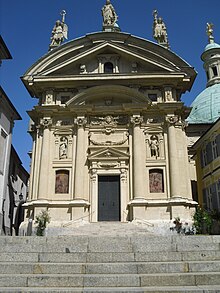Roman Catholic Diocese of Graz-Seckau
|
Diocese of Graz-Seckau Dioecesis Seccoviensis (Latin) Diözese Graz-Seckau (German) |
|
|---|---|

St. Catherine of Alexandria Church with Mausoleum of Ferdinand II, Holy Roman Emperor
|
|
| Location | |
| Country | Austria |
| Territory | Styria |
| Ecclesiastical province | Salzburg |
| Metropolitan | Archdiocese of Salzburg |
| Statistics | |
| Area | 16,392 km2 (6,329 sq mi) |
| Population - Total - Catholics |
(as of 2013) 1,213,255 863,286 (71.2%) |
| Information | |
| Denomination | Roman Catholic |
| Rite | Roman Rite |
| Established | June 22, 1218 |
| Cathedral | Graz Cathedral |
| Patron saint |
Saint Rupert Saint Virgil |
| Current leadership | |
| Pope | Francis |
| Bishop | Wilhelm Krautwaschl |
| Metropolitan Archbishop | Franz Lackner |
| Emeritus Bishops | Johann Weber Bishop Emeritus (1969-2001) Egon Kapellari Bishop Emeritus (2001-2015) |
| Map | |
 |
|
| Website | |
| Website of the Diocese | |
The Roman Catholic Diocese of Graz-Seckau (Latin: Dioecesis Seccoviensis, German: Diözese Graz-Seckau) is a diocese comprising the Austrian state of Styria and is part of the Ecclesiastical province of Salzburg.
The See of Seckau was founded by Archbishop Eberhard II of Salzburg, with the permission of pope Honorius III, on 22 June 1218, as suffragan of Salzburg. Emperor Frederick II gave his consent on 26 October 1218 and conferred on the incumbent of the see the dignity of prince of the Roman Empire. The first bishop was Provost Karl von Friesach (1218–30).
Under Habsburg Emperor Joseph II, the diocese was reorganized and its territory enlarged. The original intention of the emperor, to establish an archbishopric at Graz, was frustrated by the opposition of the Archbishop of Salzburg.
In 1786, however, the residence of the prince-bishop was transferred from Seckau to Graz, the capital of Styria, but the name of the diocese remained unchanged. A new cathedral chapter was installed at Graz, composed at first of three dignitaries and four canons. The see included thenceforth the Salzburg territory in Styria; at the same time a new diocese, the Diocese of Leoben, was created for Upper Styria. After the death of the first and only Bishop of Leoben, the administration of this see was entrusted in 1808 to the bishops of Seckau. The limits of Seckau are due to a regulation of 1859, incorporating the Diocese of Leoben into that of Seckau, while Seckau ceded Southern Styria with its (chiefly) Slovenian population to the Diocese of Lavant.
...
Wikipedia
